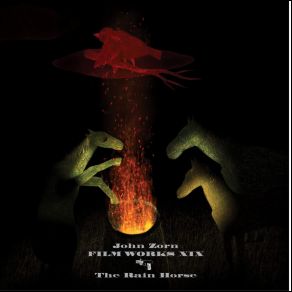Filmworks XIX
Download links and information about Filmworks XIX by John Zorn. This album was released in 2008 and it belongs to Jazz, Avant Garde Jazz, Avant Garde Metal, Alternative, Theatre/Soundtrack, Classical genres. It contains 11 tracks with total duration of 40:32 minutes.

|
|
|---|---|
| Artist: | John Zorn |
| Release date: | 2008 |
| Genre: | Jazz, Avant Garde Jazz, Avant Garde Metal, Alternative, Theatre/Soundtrack, Classical |
| Tracks: | 11 |
| Duration: | 40:32 |
| Buy it NOW at: | |
| Buy on iTunes $9.99 | |
| Buy on iTunes $9.99 | |
Tracks
[Edit]| No. | Title | Length |
|---|---|---|
| 1. | Tears of Morning | 4:32 |
| 2. | The Stallion | 2:42 |
| 3. | Tree of Life | 3:01 |
| 4. | Wedding of Wild Horses | 4:21 |
| 5. | Forests In the Mist | 6:09 |
| 6. | Dance Exotique | 2:59 |
| 7. | Bird In the Mist | 4:01 |
| 8. | Parable of Job | 4:17 |
| 9. | Encounter | 2:10 |
| 10. | The Rain Horse | 4:16 |
| 11. | End Credits | 2:04 |
Details
[Edit]It has been 22 months since Film Works, Vol. 18: The Treatment was released on Tzadik. While it's true that John Zorn has been outrageously busy with many other projects, including his writing and getting his wonderful second book of Masada compositions, Book of Angels, recorded by many artists, it nonetheless seems strange that there has been so much time between the releases of his soundtrack recordings. This series of cues written for Russian animator/director Dimitri Geller's The Rain Horse makes the wait utterly worthwhile. In his always entertaining liner notes, Zorn says that Geller initially approached him in order to license some tracks from the Book of Angels series for an animated film. Zorn asked to see some of his work and was taken by this story of an old dying horse who has fallen into a ravine and landed on a tree trunk — the Tree of Life — and has an awakening, a rebirth, as a final epiphany. Zorn recruited cellist Erik Friedlander, Rob Burger (who was originally going to play accordion but ended up, at the composer's request, playing piano), and bassist Greg Cohen. Quite a trio. For those looking for Zorn's more open and angular film compositions, this will come as a surprise. This is chamber music that alternates between cues that consciously invoke notions of old Hebrew folk music, Gypsy ballads, and modern composition, sometimes, as in the second cue, "The Stallion," during the same piece. There are 11 cues between the opening theme, "Tears of Morning," and the end credits, and the composer had no idea at pressing time what would be used in the final version of the film, given that the duration of the motion picture was only 11 minutes and what's here totals over 40. It doesn't matter: recorded in a single day and sequenced for the most part as it was taped, this music is wonderfully kinetic despite its lush, unapologetic melodic interplay, shimmering dynamics, and uncanny restraint. Zorn has taken his own compositions to a new level of accessibility here, obviously touched by the images in the film. The dreaminess and sense of motion and reverie are complete throughout. Memory feels like a prime theme here, as melodic passages are touched upon and investigated again later. The feeling of freedom and transformation is inherent in this performance, which is just stunning — check the deep listening and rhythmic invention and counterpoint in "Wedding of Wild Horses," and the literally finger-popping rhythm in "Dance Exotique," which is executed between pizzicato bass and prepared piano (with Silly Putty no less) as Friedlander slips around the melody with a passionate focus. One could cite every track here as extraordinary in some way, but taken as a whole, this soundtrack throws down the gauntlet to almost anyone composing film music — especially for a chamber ensemble — today. Morricone is still the king, but one can envision him applauding the elegance, taste, and slow-burning fire in this score.